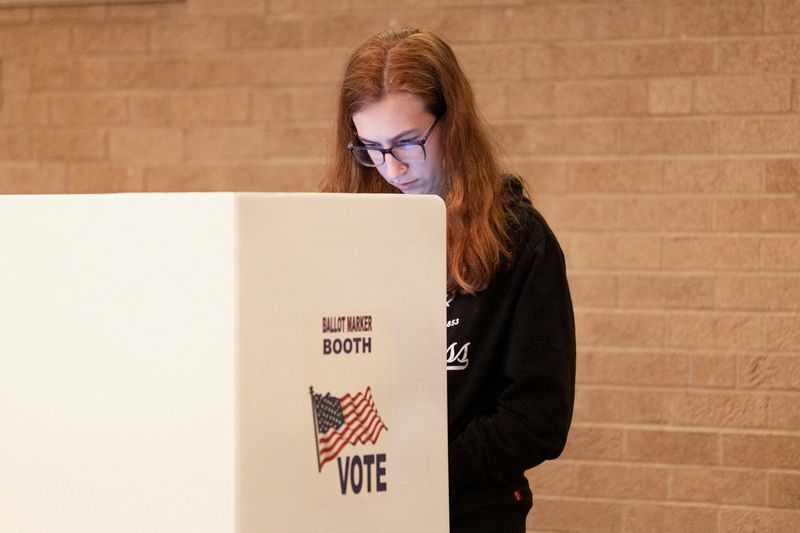By Joseph Ax
(Reuters) - The U.S. Supreme Court's decision last year to eliminate a nationwide right to abortion was a moment of triumph for conservatives who had labored for five decades to overturn the 1973 Roe v. Wade ruling.
Nearly two dozen Republican-controlled states have taken advantage of the ruling to impose new restrictions on abortion, curtailing access to the procedure for tens of millions of women.
But the ruling has also turned the issue into a political liability for Republicans. Voter backlash was widely credited with limiting Republican gains in the 2022 congressional midterm elections, as well as propelling Democrats to victories last month in Virginia and Kentucky.
Every statewide ballot question about reproductive rights since 2022 - seven in all - has yielded victory for abortion rights advocates, including in conservative states such as Ohio, Kansas and Kentucky.
Republican presidential candidates, including frontrunner Donald Trump, have struggled to articulate a position on abortion that would satisfy both the evangelical Christians who comprise a critical Republican voting bloc as well as the swing voters who prefer abortion remain accessible.
President Joe Biden's re-election campaign and Democratic-aligned groups intend to put abortion rights at the center of next year's White House contest.
"It's pretty evident, both with research and the elections we held in 2023, that abortion is a winning issue for us," said Danielle Butterfield, the executive director of Priorities USA, a leading Democratic super PAC, or fundraising committee. "We plan to communicate heavily on the issue heading into 2024."
WHY IT MATTERS
The 2022 Supreme Court decision has deepened the cultural divide between conservative and liberal states.
Many states under Democratic control, such as New York, California and Maryland, have enacted additional protections for reproductive rights since the ruling, while Republican-dominated states - including most of the South - have banned or limited abortion.
The number of patients traveling to other states to get an abortion has doubled since 2020, reaching nearly one in five, according to research published in December by the pro-reproductive rights Guttmacher Institute.
The restrictions have also accelerated the use of medication abortions, which now account for more than half of all procedures, according to Guttmacher.
In August, the conservative 5th U.S. Circuit Court of Appeals barred telemedicine prescriptions and mail shipments of mifepristone, a pill used to perform medication abortions.
On Wednesday, the Supreme Court agreed to review that ruling at the request of the Biden administration, one of many legal battles at the state and national level that will continue in 2024.
WHAT IT MEANS FOR 2024
Abortion is bedeviling the Republican presidential candidates.
Trump has taken credit for appointing three right-wing justices to the Supreme Court, securing the majority needed to overturn Roe in the first place. But he has also avoided saying whether he would sign a national ban into law.
Florida Governor Ron DeSantis, trailing far behind Trump in the race for the Republican presidential nomination, signed a six-week ban in his home state and has said he would support a 15-week national limit.
Former U.N. Ambassador Nikki Haley, the only woman in the race, has urged Republicans to focus on finding consensus, rather than faulting those who favor abortion rights.
Ryan Stitzlein, vice president of political and government relations for the national group Reproductive Freedom for All, said Republicans simply cannot win on the subject.
"They think this is a messaging issue, where this is actually a policy issue," he said.
Reproductive rights advocates - bolstered by Ohio's November vote to protect abortion rights - are gathering signatures for similar ballot measures in 2024 in several states. The list includes presidential battlegrounds such as Arizona, Nevada and Florida.
Carol Tobias, president of the National Right to Life Committee, said anti-abortion groups have to improve fundraising efforts to counter the money pouring into those statewide campaigns.
"It's easy to look at '23 - '24 as this small, narrow window," she said. "But the movement has been here for 50 years. Yes, we lost some battles in the last election cycle, but that doesn't mean we're just going to walk away."
Some 70% of Americans said protecting abortion access in their state would be an important issue in determining their vote in November, including around two-thirds of independent voters, according to a Reuters/Ipsos poll conducted Dec. 5-11. About half of Americans said they would support a law legalizing abortion nationwide, including close to one-third of Republicans.
However, with 11 months until the election, it is too early to say where abortion will ultimately rank among voters' top issues.
Butterfield, of Priorities USA, said the group's research found that abortion remains a top concern for swing voters. The group plans a $75 million digital ad campaign next year that will emphasize abortion as a central issue.

But Gunner Ramer, the political director for the anti-Trump Republican Accountability Project, said its focus groups with swing voters revealed that economic worries outweigh all others.
"Abortion mattered in 2023, but I think as concerns over the economy continue looming over this presidential cycle, that will be the most important issue," he said.